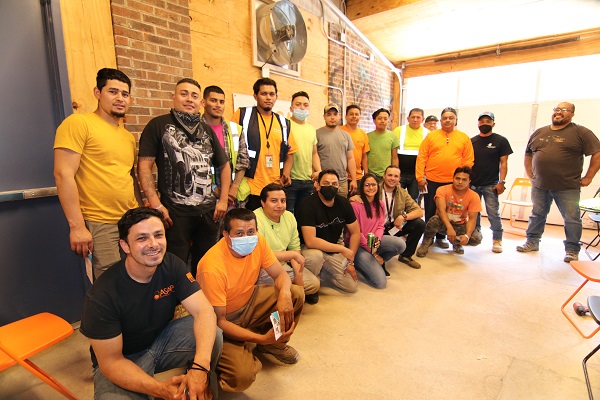Photo credit: Literacy Council of Montgomery County (LCMC)
As a longtime teacher of English as a Second Language, and as a program administrator for a WIOA-funded IET program that serves close to 1,200 adult learners, I have made it a priority to support and guide our students, especially those who are immigrants and refugees. I am an immigrant as well. I was lucky to already be able to speak the language of my new home country and to find a job that was similar to my job back home in Turkey. But what about those who lack access to education? Or those who have credentials from their home countries, but do not know where to start in the U.S.? How can we help these new neighbors build careers? This blog post provides information about a program that can help: WIOA-funded Adult Integrated Education and Training (IET).
What is WIOA-funded Adult Integrated Education and Training (IET)?
The Workforce Innovation Opportunities Act (WIOA) is landmark legislation designed to strengthen the nation’s workforce system and reduce barriers for jobseekers. It helps clients find sustainable jobs through upskilling to meet the needs of industries around the U.S. One program area funded by WIOA is Integrated Education and Training, or IET. These programs, available across the U.S., support clients in learning English, gaining certifications in a specific field, and practicing resume writing, interview skills, financial literacy, and general job readiness. IET programs are also important because they are directly connected to the nearly 2,400 One-Stop Career Centers and American Job Centers (AJCs) in the U.S. AJCs provide an array of employment services and connect jobseekers to work-related training and education.
A key feature of IET programs is certification services through partnerships with nonprofits, community colleges, and other adult education programs. For example, at Literacy Council of Montgomery County (LCMC), our team offered an I.T. Fundamentals course leading to Comp TIA A + Certification. The program included a women-only cohort designed to encourage the participation of single mothers and women of color. During the course, participants also received training in interview skills, resume writing, and mock interviews. This program was offered at no cost to the participants in the last fiscal year.
Who is Eligible to Participate in IET?
IET falls within WIOA’s Title II programming. Refugees, special immigrant visa holders (SIVs), and other Office of Refugee Resettlement (ORR)-eligible populations may all participate in Title II programs. Work authorization is not a requirement on the federal level, so Afghan new arrivals without work authorization can also participate, except where work authorization requirements have been imposed on the state level. To learn more about WIOA in your state, see your Workforce Innovation and Opportunity Act (WIOA) State Plan.
Per Section 188 of WIOA, no individual can be excluded from participation in WIOA services or discriminated against on the basis of race, color, religion, sex, national origin, age, disability, or political affiliation or belief, or on the basis of certain citizenship statuses.
How Can Refugee Service Providers Connect with IET Programs?
Refugee service providers can connect their clients with WIOA-funded adult education programs. Here are a few steps to take:
- Research IET programs in your area. Which is the closest to your agency, or to locations where clients live? To find an IET program in your state or county, see the WIOA-Eligible Training Program Finder.
- Contact IET programs to learn about their services. Ask an IET program representative to give your agency a presentation of services offered.
- Screen your clients’ skills, educational background, and work history to see if their needs and goals align with IET programs being offered.
- Discuss your clients’ needs with IET programs. If refugee service providers have several prospective learners who are interested in a particular service or certification, an IET program may be willing to offer it. To learn more about what services may be possible, see the Integrated Education and Training (IET) Guide from Literacy Information and Communication System (LINCS).
- Create a mutually beneficial relationship. What does the IET program need and how can you, as a refugee service provider, help fill those needs? As one step, consider inviting IET program representatives to job readiness training, orientations, job fairs, etc. to support them in enrolling clients in their services.
Are you a refugee service provider who partners with an Integrated Education and Training program, or vice-versa? Email Switchboard@Rescue.org to share your promising practices!
IET programs can be great partners to help refugees and other newcomers advance in their new communities. We are ready to serve and are eager to connect with refugee service providers. We all are neighbors, and we are here to support one another!
More Resources
- U.S. Department of Labor, WIOA Technical Assistance and Stakeholder Engagement
- U.S. Department of Education, Perkins Collaborative Resource Network, Workforce Innovation and Opportunity Act (WIOA)– See this link to find the full WIOA legislation
- National Immigration Forum, Fact Sheet: What is WIOA Title II and Who Does it Serve?
- Literacy Information and Communication System (LINCS), Building Opportunities through Integrated English Literacy and Civics Education
- LINCS, Integrated Education and Training: A Career Pathways Policy & Practice
- LINCS, Integrated Education and Training (IET) Guide










